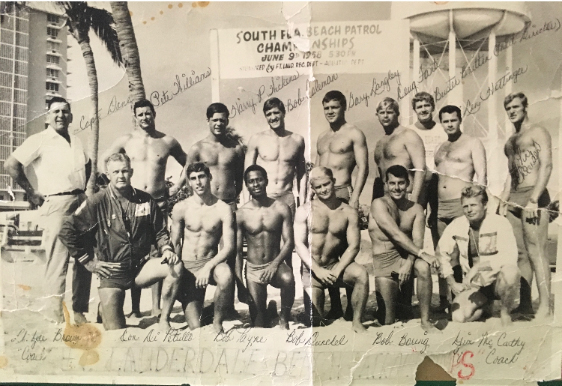Racism in Aquatics: The Robert Payne Story
By Lifeguard Lieutenant Ken Roland
FORT LAUDERDALE, FL — On June 9, 1958, history was made on Fort Lauderdale Beach as Robert Payne became the first Black American to compete in the South Florida Beach Patrol Championships. As a member of a predominantly white beach patrol, Payne’s presence on the sand was more than just athletic prowess—it was a breakthrough moment in the fight for racial equality in aquatics.
Payne was a swimmer of unparalleled strength and speed, often hailed as “King of the Lifeguards” among the various beach patrols. However, his journey was anything but easy. As the first Black lifeguard in his division, he faced relentless hazing from colleagues and management. The beach patrol chief, Gene Bergman, was known for his tough demeanor, and while he was strict with everyone, Payne endured unique challenges due to the color of his skin.
Despite the hostility, Payne persevered and built a legacy that extended far beyond the beach. Under the mentorship of Dillard High School coach Mr. Tymes and Moses “Buddy” Wilcox, the pool manager at Sunland Park, Payne fostered a swimming tradition in Fort Lauderdale’s Black community. The Sunland Park Sea Horses, an all-Black swim team, became a dominant force in the segregated swim league, remaining undefeated for years.
Payne’s efforts caught the attention of legendary coach Jack Nelson, who saw the potential in Black swimmers. As an outreach to underserved communities, Nelson recruited eight of Payne’s top swimmers to train at the prestigious International Swimming Hall of Fame Pool. Among them were Conrad and Tommy Reddick, Willie “Moby Dick” James, Don Timothy James, and a young swimmer named Ken Roland—who would go on to make history himself.
Breaking Barriers Beyond the Beach
Robert Payne’s influence didn’t stop at the water’s edge. He transitioned from beach patrol to become the Aquatic Supervisor for community pools. Yet, even with his expertise, he was denied the opportunity to become an American Red Cross Water Safety Instructor Trainer—a position that always required Black instructors to be trained by white counterparts. The honor of being the first Black American Red Cross Instructor Trainer ultimately went to one of his protégés: Ken Roland.
While Payne was allowed to supervise pools in Black neighborhoods, a managerial position on the beach was never an option. Facing continued harassment from white female management at the pools, Payne eventually shifted into pool maintenance and field management, where he worked until retirement.
The systemic racism that Payne encountered inspired the next generation of Black lifeguards, including Roland. After graduating from Purdue University, Roland rebuilt his strength following a near-fatal car accident by returning to the Encouraged by Payne, he applied for a part-time lifeguard position. However, despite his qualifications, a full-time position went to a white candidate—one who later admitted he got the job because of family connections rather than merit.
Frustrated but determined, Roland took matters into his own hands. During a lunch break, he applied for a full-time position at the Westside Pool in Pompano Beach. This decision marked the beginning of a career that would make history. Roland eventually became the first Black man to lead a predominantly white beach patrol on the East Coast of America.
A Legacy Cemented in History
In a full-circle moment, Roland had the honor of presenting Robert Payne with an award from Diversity in Aquatics, recognizing his pioneering contributions to the field.
“There would be no Lifeguard Lieutenant Ken Roland without Robert Payne,” Roland reflected. “I stand on the shoulders of giants.”
From the beaches of Fort Lauderdale to the community pools of Pompano Beach, Payne’s legacy lives on. His story serves as a reminder that while racism in aquatics sought to keep Black Americans out of the water, men like Robert Payne and those he mentored refused to be denied.
Their perseverance not only changed the face of lifeguarding but also opened doors for future generations to swim, compete, and lead.
